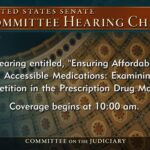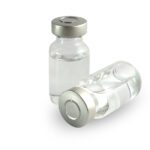Will Congress Finally Act on Patent Thickets?
Alex Brill and Christy Robinson | Commentary
The Senate Judiciary Committee is having patent thicket déjà vu. In 2019, the Committee moved legislation to prevent brand drug companies from amassing superfluous patents around their products—a strategy that, as we’ve written before, is uniquely problematic in the United States. That bill, and others that followed, came to naught. Now, the Judiciary Committee is poised to hold another hearing about competition in the prescription drug market. Will Congress finally do something about patent thickets?
Meanwhile, time is money. The longer brand companies can unduly keep competitors off the market, the more excess profits they earn. In January 2023, we looked at five brand drugs known to be protected by patent thickets (Enbrel, Eylea, Humira, Imbruvica, and Opdivo) and estimated the one-year cost to the US healthcare system from delayed competition. Humira, long the posterchild of patent thickets, finally (and slowly) began facing competition last year after more than 20 years on the market. The other four drugs are still protected from generic or biosimilar competition. By our estimate, the one-year cost of patent thickets around these four products ranges from $1.9 billion to $3.1 billion per drug.
In other words, as the status quo patent system lives on, valuable pharmaceutical savings continue to be lost and new patent thickets formed. For example, Enbrel has been on the market unchallenged for 26 years, while Opdivo is relatively new (approved in 2014). If Congress doesn’t act, each year of delay for these drugs and others like them will result in billions of dollars of extra spending.
The Senate Judiciary Committee’s efforts in 2019 included a hearing focused on the need to strike a careful balance between pharmaceutical innovation and competition, followed by Committee action the following month on a suite of bills. These included the Affordable Prescriptions for Patients Act of 2019, introduced by Senator John Cornyn (R-TX) and Senator Richard Blumenthal (D-CT) to address concerns about patent thickets. At the time, Chairman Lindsey Graham (R-SC) said, “I look forward to taking this legislation up on the floor as soon as possible.”
By October of that year, however, Politico was reporting:
A bipartisan Senate effort to crack down on drug companies that game the patent system to shut out cheaper competitors has become a bargaining chip in the roiling debate over pharmaceutical prices. . . [W]hile the Senate Judiciary Committee advanced the bill this summer, it’s being blocked by Democratic senators looking for assurances the chamber’s GOP leaders will take up comprehensive legislation to address drug costs.
Ultimately, patent thicket reform was a victim of these political machinations. Now, Congress may have another opportunity. This week’s hearing could create the momentum necessary for enactment of patent thicket legislation.
But there are risks too. Legislation that weakens existing mechanisms to challenge patents is also afoot. The PREVAIL Act, for example, seeks to reform the inter partes review (IPR) process at the US Patent and Trademark Office but would have unintended negative consequences for drug competition. While imperfect in its current structure, IPR does create an important opportunity for review of patentability, and efforts to limit this process will ultimately harm competition.
We’ll be watching tomorrow’s hearing closely. Check back here for our take.












